-
AMR Idea Development Workshop
Deadlines for extended abstracts: 18 February 2022 for Special Topic Forum: Theorizing Time in Management and Organizations.
-
Melbourne Business School-The University of Melbourne
, Carlton
Postponed—check back for future updates.
-
AOM's 2020 Annual Meeting is now online
Registration is open for the virtual Annual Meeting
-
Rationality and Management Learning and Education
This special issue raises three grounding questions for management learning and education.
-
Nominations for the Position of AMP Editor
AOM seeks your recommendation for individual(s) who you deem capable and inclined to accept this position of responsibility. Nominations, including self-nominations, will be accepted until 1 October 2020.
-
Midwest Academy of Management Conference
, Davenport
-
AMJ Special Research Forum - Joining Conversations in the Society on Management and Organizations
Submissions are due by 30 November 2020. Contributors should follow the directions for manuscript submission described in “Information for Contributors” in the front of each issue of AMJ and on AMJ's Contributor Information Page.
-
AMD Virtual Paper Development Workshop
13 Nov 2020, 8:00 AM - 13 Nov 2020, 11:00 AM13 Nov 2020, 8:00 AMAcademy of Management Discoveries (AMD) is pleased to offer a unique opportunity for management scholars to develop their empirical exploration papers, the AMD Paper Development Workshop in November 2020.
-
AMLE Virtual Paper Development Workshop on Scholarly Impact
We define scholarly impact as an “auditable or recordable occasion of influence” arising out of research (Haley, Page, Pitsis, Rivas and Yu, 2017); this special issue will explore influence through research on communities that include not just scholars, but also other external and internal stakeholders such as regulators, policymakers, managers, students and society at large.
-
AMD Virtual Paper Development Workshop
18 Mar 2021, 3:00 PM - 18 Mar 2021, 6:00 PM18 Mar 2021, 3:00 PMAcademy of Management Discoveries (AMD) is pleased to offer a unique opportunity for management scholars to develop their empirical exploration papers, the AMD Paper Development Workshop in March 2021.
-
AMR Idea Development Workshop Special Topic Forum (STF)
30 Mar 2021, 10:00 AM - 01 Apr 2021, 11:30 AM30 Mar 2021, 10:00 AMThe New Normal: Positive organizational impact in an age of disruption.
-
AMP Virtual Proposal Development Workshop
01 May 2021, 8:00 AM - 17 May 2021, 12:00 PM01 May 2021, 8:00 AMThis workshop is a unique opportunity for management scholars to develop their work for possible publication in Academy of Management Perspectives.
-
AMD Oceania Workshop 2021
This two-part workshop helps attendees learn about AMD and then to create a proposal for a project that follows the AMD mission and focus.
-
Special Issue - Learning and Education Strategies for Scholarly Impact
We define scholarly impact as an “auditable or recordable occasion of influence” arising out of research (Haley, Page, Pitsis, Rivas and Yu, 2017); this special issue will explore influence through research on communities that include not just scholars, but also other external and internal stakeholders such as regulators, policymakers, managers, students and society at large.
-
AMR Idea Development Workshop (IDW) on Trust in Today’s Changing Theoretical and Contextual Landscapes
The purpose of the workshop is to help authors develop and refine ideas for submission to a forthcoming Special Topic Forum at the Academy of Management Review.
-
Collections 'Meet the Editors' Workshop
Meet the editors of AOM's latest journal in this introduction to Academy of Management Collections.
-
The 81st Annual Meeting of the Academy of Management
Join us for the world's premier event for scholarly engagement around management and organization research.
-
AMR Idea Development Workshop (IDW) on Developing Theories Grounded in African Experience
This paper draft development workshop (PDDW) is aimed at exploring the opportunities and processes for developing theories of management and organization that are indigenous to Africa.
-
AMR Special Topic Forum - The New Normal: Positive Organizational Impact in an Age of Disruption
Submission Date: 30 September 2021. Guest Editors: Flore Bridoux, Jonathan Bundy, Jean-Pascal Gond, Patrick Haack, Jennifer Petriglieri, John Paul Stephens, and Kathleen Sutcliffe.
-
Special Issue — New Histories of Business Schools and How They May Inspire New Futures
We might do well to re-examine what we are doing and show the executive judgment and courage necessary to implement radical change (Khurana & Spender 2012: 636).
-
AMR Idea Development Workshop
Deadlines for extended abstracts: 18 February 2022 for Special Topic Forum: Theorizing Time in Management and Organizations.
-
Melbourne Business School-The University of Melbourne
, Carlton
Postponed—check back for future updates.
-
AOM's 2020 Annual Meeting is now online
Registration is open for the virtual Annual Meeting
-
Rationality and Management Learning and Education
This special issue raises three grounding questions for management learning and education.
-
Nominations for the Position of AMP Editor
AOM seeks your recommendation for individual(s) who you deem capable and inclined to accept this position of responsibility. Nominations, including self-nominations, will be accepted until 1 October 2020.
-
Midwest Academy of Management Conference
, Davenport
-
AMJ Special Research Forum - Joining Conversations in the Society on Management and Organizations
Submissions are due by 30 November 2020. Contributors should follow the directions for manuscript submission described in “Information for Contributors” in the front of each issue of AMJ and on AMJ's Contributor Information Page.
-
AMD Virtual Paper Development Workshop
13 Nov 2020, 8:00 AM - 13 Nov 2020, 11:00 AM13 Nov 2020, 8:00 AMAcademy of Management Discoveries (AMD) is pleased to offer a unique opportunity for management scholars to develop their empirical exploration papers, the AMD Paper Development Workshop in November 2020.
-
AMLE Virtual Paper Development Workshop on Scholarly Impact
We define scholarly impact as an “auditable or recordable occasion of influence” arising out of research (Haley, Page, Pitsis, Rivas and Yu, 2017); this special issue will explore influence through research on communities that include not just scholars, but also other external and internal stakeholders such as regulators, policymakers, managers, students and society at large.
-
AMD Virtual Paper Development Workshop
18 Mar 2021, 3:00 PM - 18 Mar 2021, 6:00 PM18 Mar 2021, 3:00 PMAcademy of Management Discoveries (AMD) is pleased to offer a unique opportunity for management scholars to develop their empirical exploration papers, the AMD Paper Development Workshop in March 2021.
-
AMR Idea Development Workshop Special Topic Forum (STF)
30 Mar 2021, 10:00 AM - 01 Apr 2021, 11:30 AM30 Mar 2021, 10:00 AMThe New Normal: Positive organizational impact in an age of disruption.
-
AMP Virtual Proposal Development Workshop
01 May 2021, 8:00 AM - 17 May 2021, 12:00 PM01 May 2021, 8:00 AMThis workshop is a unique opportunity for management scholars to develop their work for possible publication in Academy of Management Perspectives.
-
AMD Oceania Workshop 2021
This two-part workshop helps attendees learn about AMD and then to create a proposal for a project that follows the AMD mission and focus.
-
Special Issue - Learning and Education Strategies for Scholarly Impact
We define scholarly impact as an “auditable or recordable occasion of influence” arising out of research (Haley, Page, Pitsis, Rivas and Yu, 2017); this special issue will explore influence through research on communities that include not just scholars, but also other external and internal stakeholders such as regulators, policymakers, managers, students and society at large.
-
AMR Idea Development Workshop (IDW) on Trust in Today’s Changing Theoretical and Contextual Landscapes
The purpose of the workshop is to help authors develop and refine ideas for submission to a forthcoming Special Topic Forum at the Academy of Management Review.
-
Collections 'Meet the Editors' Workshop
Meet the editors of AOM's latest journal in this introduction to Academy of Management Collections.
-
The 81st Annual Meeting of the Academy of Management
Join us for the world's premier event for scholarly engagement around management and organization research.
-
AMR Idea Development Workshop (IDW) on Developing Theories Grounded in African Experience
This paper draft development workshop (PDDW) is aimed at exploring the opportunities and processes for developing theories of management and organization that are indigenous to Africa.
-
AMR Special Topic Forum - The New Normal: Positive Organizational Impact in an Age of Disruption
Submission Date: 30 September 2021. Guest Editors: Flore Bridoux, Jonathan Bundy, Jean-Pascal Gond, Patrick Haack, Jennifer Petriglieri, John Paul Stephens, and Kathleen Sutcliffe.
-
Special Issue — New Histories of Business Schools and How They May Inspire New Futures
We might do well to re-examine what we are doing and show the executive judgment and courage necessary to implement radical change (Khurana & Spender 2012: 636).
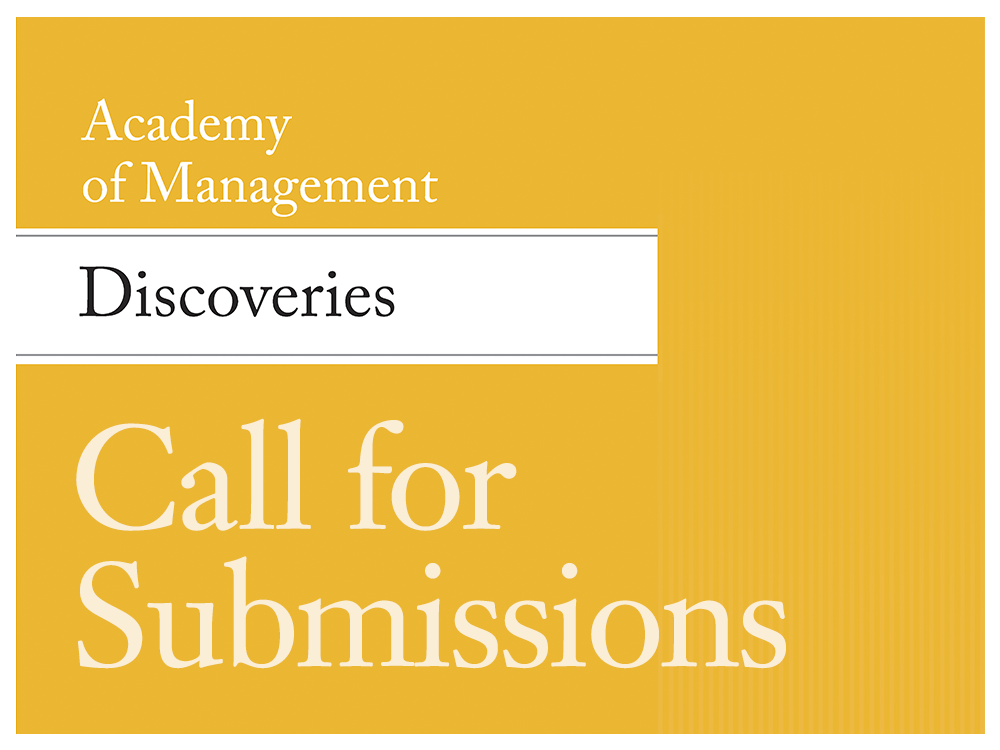
Call for Submissions: AMD Discoveries-through-Prose
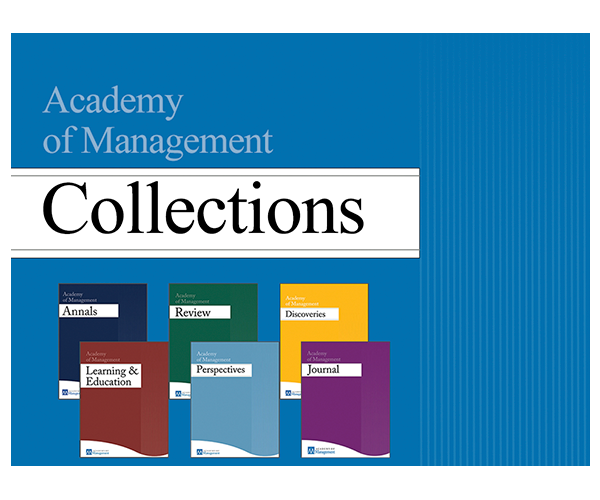
Call for Submissions: Collections

Call for Submissions: AMD Registered Reports
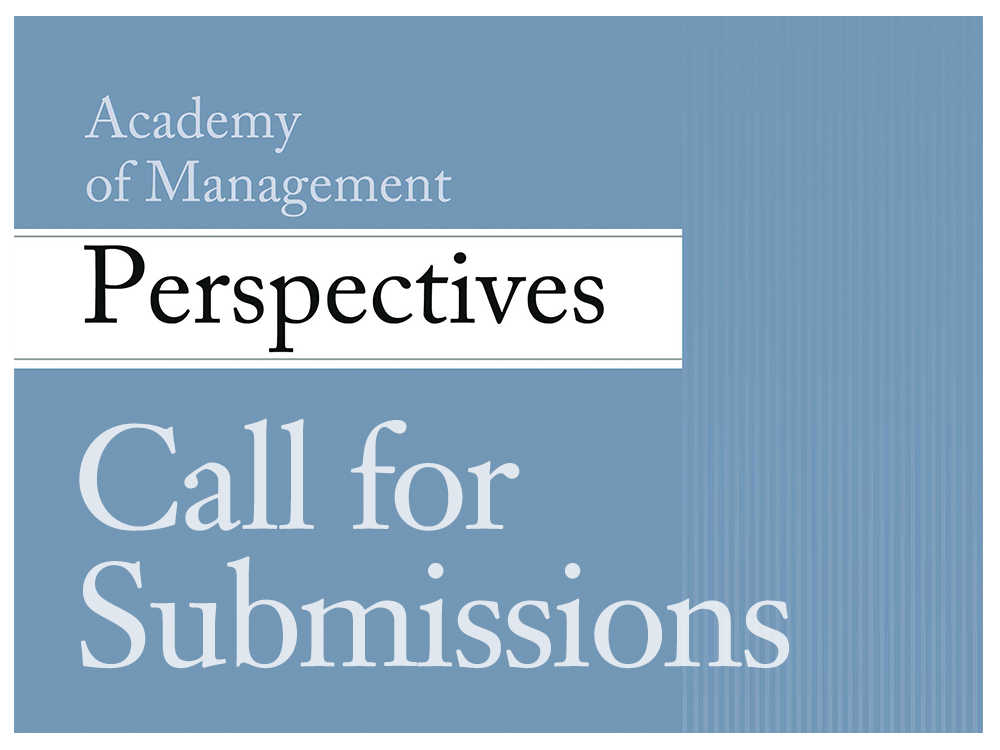
AMP Call for Special Issue Papers: Managing Under Political Turbulence

AMP Call for Special Issue Papers: Managing for Our “New Normal”
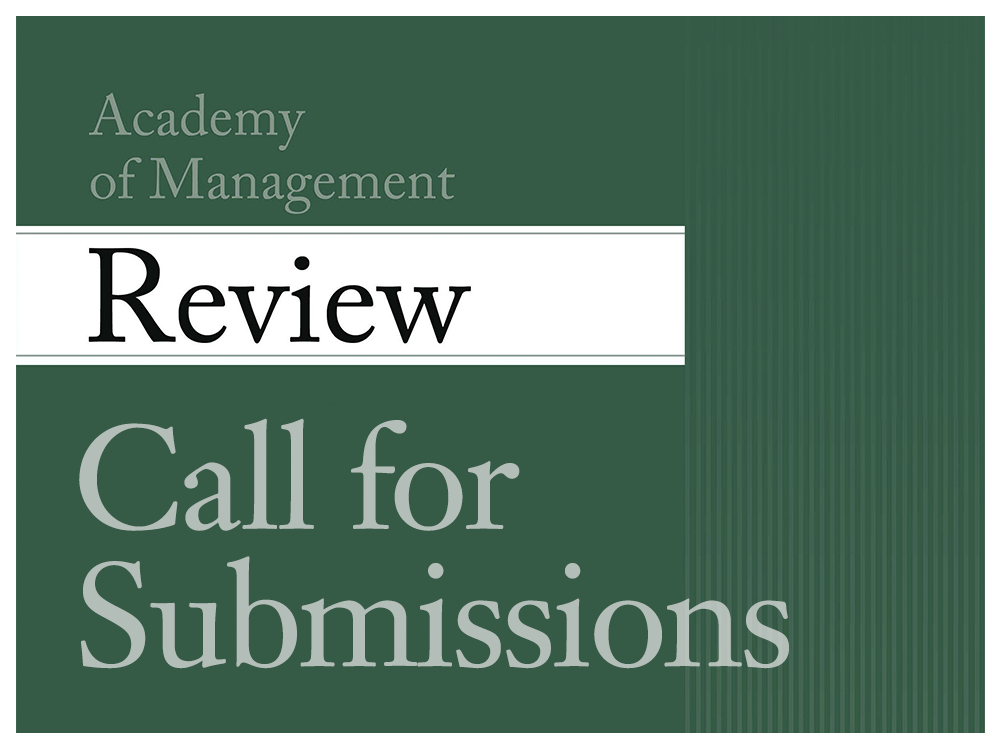
AMR Call for Special Topic Forum: Marginalized Workers and Marginalized Populations in Organizations
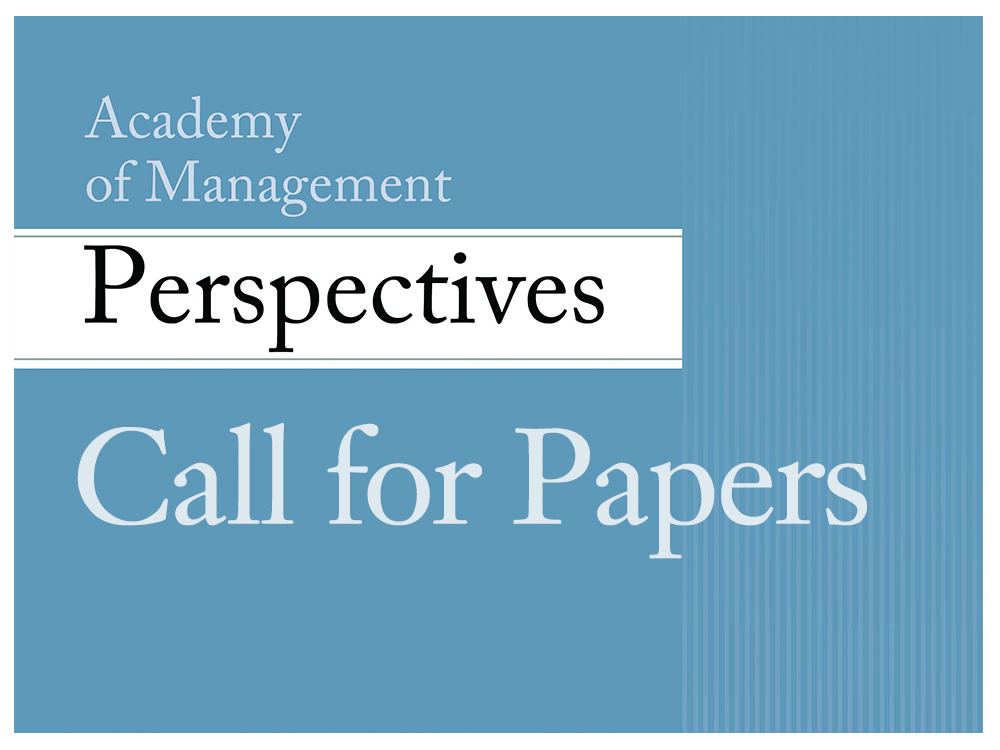
AMP Open Call for Papers
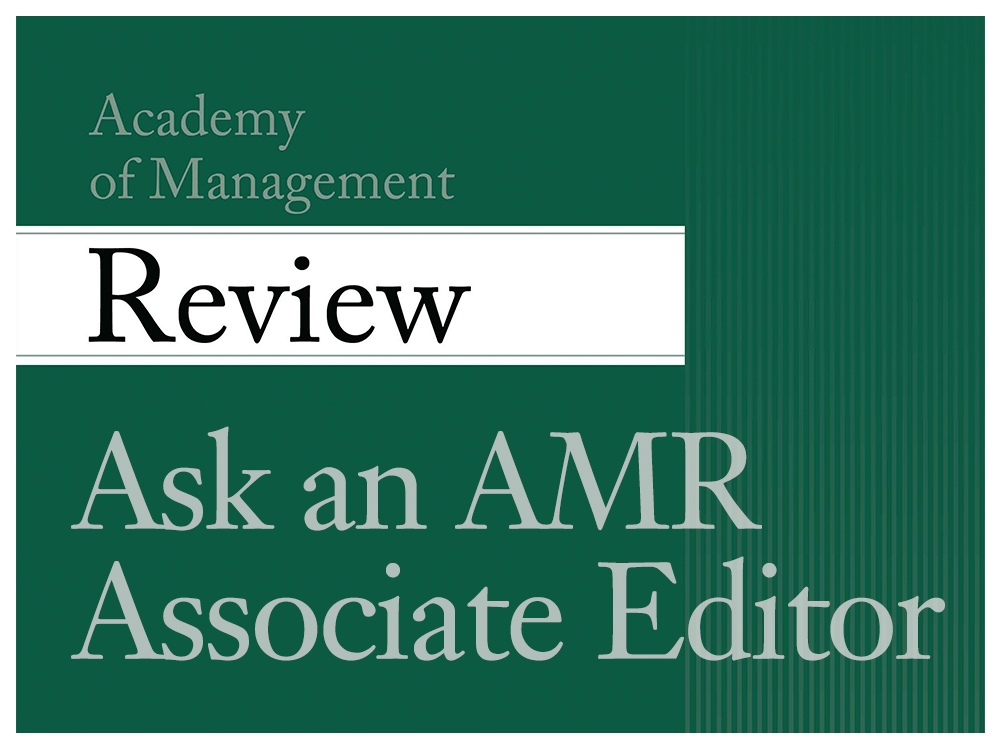
Ask An AMR Associate Editor: Dialogue Done Right: Crafting a Strong Submission for AMR

Ask An AMR Associate Editor: Writing with Clarity, Coherence, and Conciseness
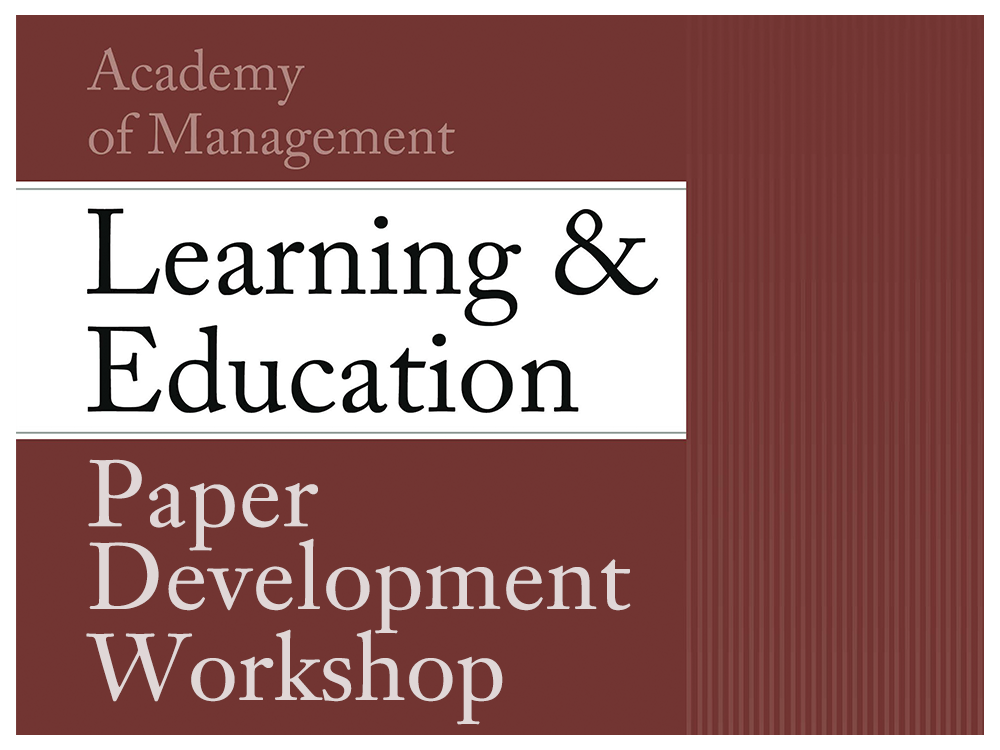
AMLE Paper Development Workshop, Wellington, New Zealand
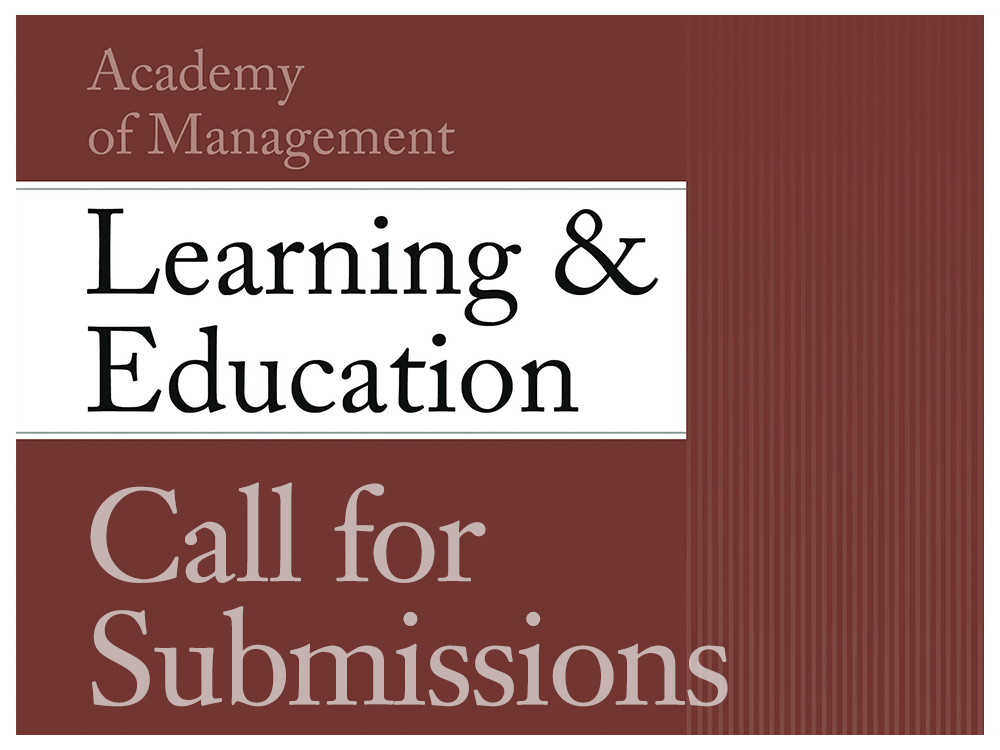
AMLE Call for Special Issue Papers: Management Learning and Education as Drivers of Fundamental Alternative Forms of Organizing
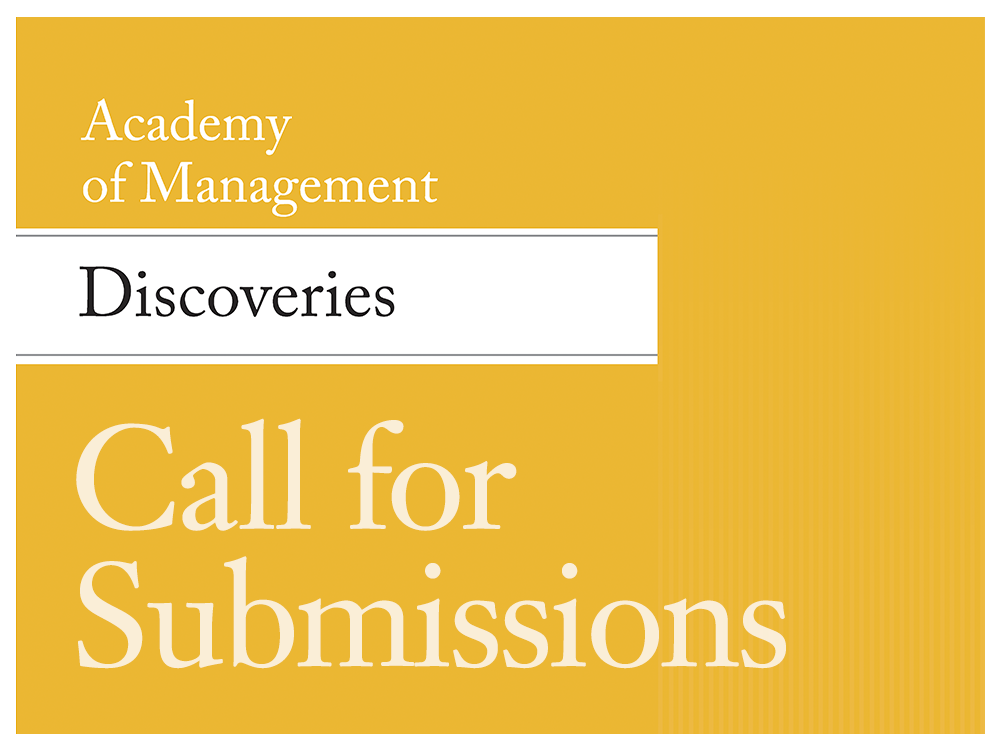
AMD Special Research Spotlight - Neurodiversity in Management and Organizations

Ask An AMR Associate Editor: Ethical Considerations Unique to Publishing Theory Papers
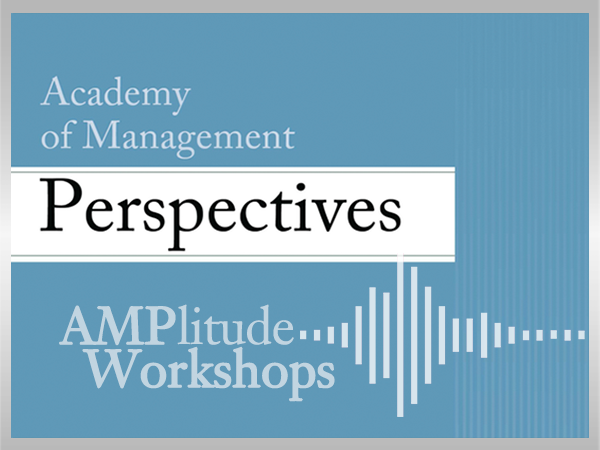
AMPlitude Workshops: Session 2

AMD Special Research Forum - Organizational Insights in Health Care

AMP Call for Special Issue Papers: Making it Better by Working Together
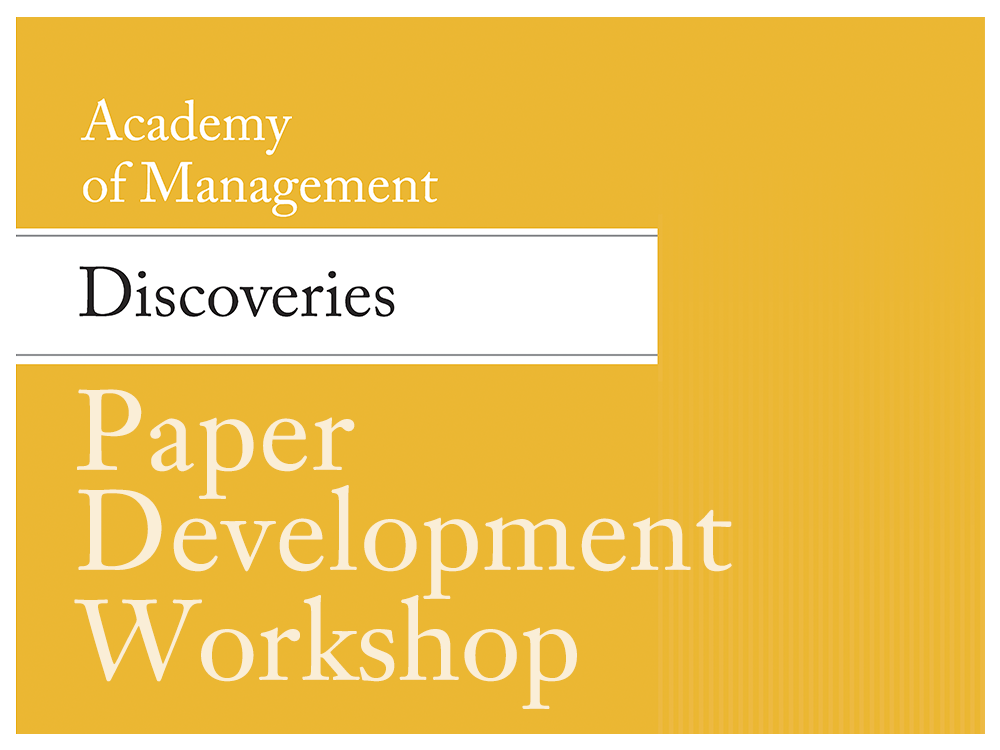
AMD Publishing and Paper Development Workshop, Zurich, Switzerland

Ask An AMR Associate Editor: Special Topic Forum on Marginalized Workers and Marginalized Populations in Organizations

Call for Nominations for Editor: AMD, AMLE, AMR
-
AMR Idea Development Workshop
Deadlines for extended abstracts: 18 February 2022 for Special Topic Forum: Theorizing Time in Management and Organizations.
-
Melbourne Business School-The University of Melbourne
, Carlton
Postponed—check back for future updates.
-
AOM's 2020 Annual Meeting is now online
Registration is open for the virtual Annual Meeting
-
Rationality and Management Learning and Education
This special issue raises three grounding questions for management learning and education.
-
Nominations for the Position of AMP Editor
AOM seeks your recommendation for individual(s) who you deem capable and inclined to accept this position of responsibility. Nominations, including self-nominations, will be accepted until 1 October 2020.
-
Midwest Academy of Management Conference
, Davenport
-
AMJ Special Research Forum - Joining Conversations in the Society on Management and Organizations
Submissions are due by 30 November 2020. Contributors should follow the directions for manuscript submission described in “Information for Contributors” in the front of each issue of AMJ and on AMJ's Contributor Information Page.
-
AMD Virtual Paper Development Workshop
13 Nov 2020, 8:00 AM - 13 Nov 2020, 11:00 AM13 Nov 2020, 8:00 AMAcademy of Management Discoveries (AMD) is pleased to offer a unique opportunity for management scholars to develop their empirical exploration papers, the AMD Paper Development Workshop in November 2020.
-
AMLE Virtual Paper Development Workshop on Scholarly Impact
We define scholarly impact as an “auditable or recordable occasion of influence” arising out of research (Haley, Page, Pitsis, Rivas and Yu, 2017); this special issue will explore influence through research on communities that include not just scholars, but also other external and internal stakeholders such as regulators, policymakers, managers, students and society at large.
-
AMD Virtual Paper Development Workshop
18 Mar 2021, 3:00 PM - 18 Mar 2021, 6:00 PM18 Mar 2021, 3:00 PMAcademy of Management Discoveries (AMD) is pleased to offer a unique opportunity for management scholars to develop their empirical exploration papers, the AMD Paper Development Workshop in March 2021.
-
AMR Idea Development Workshop Special Topic Forum (STF)
30 Mar 2021, 10:00 AM - 01 Apr 2021, 11:30 AM30 Mar 2021, 10:00 AMThe New Normal: Positive organizational impact in an age of disruption.
-
AMP Virtual Proposal Development Workshop
01 May 2021, 8:00 AM - 17 May 2021, 12:00 PM01 May 2021, 8:00 AMThis workshop is a unique opportunity for management scholars to develop their work for possible publication in Academy of Management Perspectives.
-
AMD Oceania Workshop 2021
This two-part workshop helps attendees learn about AMD and then to create a proposal for a project that follows the AMD mission and focus.
-
Special Issue - Learning and Education Strategies for Scholarly Impact
We define scholarly impact as an “auditable or recordable occasion of influence” arising out of research (Haley, Page, Pitsis, Rivas and Yu, 2017); this special issue will explore influence through research on communities that include not just scholars, but also other external and internal stakeholders such as regulators, policymakers, managers, students and society at large.
-
AMR Idea Development Workshop (IDW) on Trust in Today’s Changing Theoretical and Contextual Landscapes
The purpose of the workshop is to help authors develop and refine ideas for submission to a forthcoming Special Topic Forum at the Academy of Management Review.
-
Collections 'Meet the Editors' Workshop
Meet the editors of AOM's latest journal in this introduction to Academy of Management Collections.
-
The 81st Annual Meeting of the Academy of Management
Join us for the world's premier event for scholarly engagement around management and organization research.
-
AMR Idea Development Workshop (IDW) on Developing Theories Grounded in African Experience
This paper draft development workshop (PDDW) is aimed at exploring the opportunities and processes for developing theories of management and organization that are indigenous to Africa.
-
AMR Special Topic Forum - The New Normal: Positive Organizational Impact in an Age of Disruption
Submission Date: 30 September 2021. Guest Editors: Flore Bridoux, Jonathan Bundy, Jean-Pascal Gond, Patrick Haack, Jennifer Petriglieri, John Paul Stephens, and Kathleen Sutcliffe.
-
Special Issue — New Histories of Business Schools and How They May Inspire New Futures
We might do well to re-examine what we are doing and show the executive judgment and courage necessary to implement radical change (Khurana & Spender 2012: 636).
-
AMR Idea Development Workshop
Deadlines for extended abstracts: 18 February 2022 for Special Topic Forum: Theorizing Time in Management and Organizations.
-
Melbourne Business School-The University of Melbourne
, Carlton
Postponed—check back for future updates.
-
AOM's 2020 Annual Meeting is now online
Registration is open for the virtual Annual Meeting
-
Rationality and Management Learning and Education
This special issue raises three grounding questions for management learning and education.
-
Nominations for the Position of AMP Editor
AOM seeks your recommendation for individual(s) who you deem capable and inclined to accept this position of responsibility. Nominations, including self-nominations, will be accepted until 1 October 2020.
-
Midwest Academy of Management Conference
, Davenport
-
AMJ Special Research Forum - Joining Conversations in the Society on Management and Organizations
Submissions are due by 30 November 2020. Contributors should follow the directions for manuscript submission described in “Information for Contributors” in the front of each issue of AMJ and on AMJ's Contributor Information Page.
-
AMD Virtual Paper Development Workshop
13 Nov 2020, 8:00 AM - 13 Nov 2020, 11:00 AM13 Nov 2020, 8:00 AMAcademy of Management Discoveries (AMD) is pleased to offer a unique opportunity for management scholars to develop their empirical exploration papers, the AMD Paper Development Workshop in November 2020.
-
AMLE Virtual Paper Development Workshop on Scholarly Impact
We define scholarly impact as an “auditable or recordable occasion of influence” arising out of research (Haley, Page, Pitsis, Rivas and Yu, 2017); this special issue will explore influence through research on communities that include not just scholars, but also other external and internal stakeholders such as regulators, policymakers, managers, students and society at large.
-
AMD Virtual Paper Development Workshop
18 Mar 2021, 3:00 PM - 18 Mar 2021, 6:00 PM18 Mar 2021, 3:00 PMAcademy of Management Discoveries (AMD) is pleased to offer a unique opportunity for management scholars to develop their empirical exploration papers, the AMD Paper Development Workshop in March 2021.
-
AMR Idea Development Workshop Special Topic Forum (STF)
30 Mar 2021, 10:00 AM - 01 Apr 2021, 11:30 AM30 Mar 2021, 10:00 AMThe New Normal: Positive organizational impact in an age of disruption.
-
AMP Virtual Proposal Development Workshop
01 May 2021, 8:00 AM - 17 May 2021, 12:00 PM01 May 2021, 8:00 AMThis workshop is a unique opportunity for management scholars to develop their work for possible publication in Academy of Management Perspectives.
-
AMD Oceania Workshop 2021
This two-part workshop helps attendees learn about AMD and then to create a proposal for a project that follows the AMD mission and focus.
-
Special Issue - Learning and Education Strategies for Scholarly Impact
We define scholarly impact as an “auditable or recordable occasion of influence” arising out of research (Haley, Page, Pitsis, Rivas and Yu, 2017); this special issue will explore influence through research on communities that include not just scholars, but also other external and internal stakeholders such as regulators, policymakers, managers, students and society at large.
-
AMR Idea Development Workshop (IDW) on Trust in Today’s Changing Theoretical and Contextual Landscapes
The purpose of the workshop is to help authors develop and refine ideas for submission to a forthcoming Special Topic Forum at the Academy of Management Review.
-
Collections 'Meet the Editors' Workshop
Meet the editors of AOM's latest journal in this introduction to Academy of Management Collections.
-
The 81st Annual Meeting of the Academy of Management
Join us for the world's premier event for scholarly engagement around management and organization research.
-
AMR Idea Development Workshop (IDW) on Developing Theories Grounded in African Experience
This paper draft development workshop (PDDW) is aimed at exploring the opportunities and processes for developing theories of management and organization that are indigenous to Africa.
-
AMR Special Topic Forum - The New Normal: Positive Organizational Impact in an Age of Disruption
Submission Date: 30 September 2021. Guest Editors: Flore Bridoux, Jonathan Bundy, Jean-Pascal Gond, Patrick Haack, Jennifer Petriglieri, John Paul Stephens, and Kathleen Sutcliffe.
-
Special Issue — New Histories of Business Schools and How They May Inspire New Futures
We might do well to re-examine what we are doing and show the executive judgment and courage necessary to implement radical change (Khurana & Spender 2012: 636).